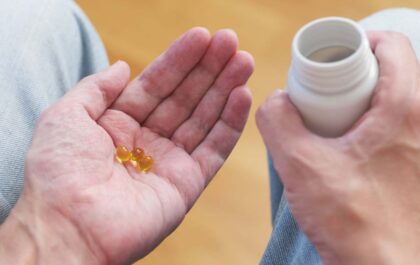Table of Contents
Introduction
Calcium deficiency could lead to problems other than just osteoporosis. If any of the following signs sound familiar to you, it may be that your body lacks calcium.
Bone Mineral Density
It’s easy to suffer from calcium deficiency, but it’s a disservice to your skeleton. According to experts at Harvard’s T.H. Chan School of Public Health, the peak of bone density is reached in the twenties, but it begins to decrease.
Make sure you get enough calcium, vitamin D (which helps your body use the mineral), and vitamin K (ditto), as they help prevent your bones from becoming porous and brittle – which in itself is the definition of osteoporosis.
The National Academy of Sciences — which sets the recommended dietary allowances — advises aiming for 1,000 milligrams per day if you’re between the ages of 19 and 50 and 1,200 mg if you’re over 50. And stay alert to signs of calcium deficiency. Here are the foods that people 50 and over should consume.
You Don’t Like Tofu
If you’re a meat lover, you may never have tasted tofu. Maybe it’s time to rethink all of that. Not only is tofu a protein-rich Asian staple, but it contains more than 40% of the daily value of calcium. And studies have shown a correlation between the consumption of soy products and stronger bones, especially in Asian women, according to the International Osteoporosis Foundation.
Tofu is a great way to increase calcium intake if you don’t eat (or can’t eat) a lot of dairies. Add it to your meals, and while you’re at it, eat more of these other foods that contain more calcium than a glass of milk.
You Broke a Bone in a Seemingly Minor Accident
If you break your wrist after a minor fall, it may be a sign that a calcium deficiency has made your bones fragile. You reach your maximum bone mass at the age of 30 – after which your bones begin to lose calcium slowly.
“It’s important to have enough calcium in the blood for the body to use this mineral reservoir instead of prompting the bones to release it,” says Shira Sussi, a dietitian in New York City. “Consuming more calcium or taking a supplement can help.” Make sure you know these essential nutrients for bone and dental health.
You Only Eat Fresh Fish
Canned fish has something that most fresh fish don’t have: edible bones. “I often say people don’t eat enough canned fish like sardines or salmon. Of course, you’ll eat bones, but they’re so small and soft that you can enjoy their calcium benefits without choking. Oysters, often found canned or jarred, are another excellent source of calcium.
Muscle Cramps due to Calcium Deficiency
A muscle cramp is not alarming, but if it persists, a call to your doctor is probably necessary, as you may suffer from a severe calcium deficiency. While a short-term calcium deficiency usually doesn’t produce obvious physical symptoms, chronic calcium deficiency can lead to muscle sensitivity, contraction, or general malaise, as this mineral helps your muscles move.” Your calcium levels should never be so low that you experience these symptoms. “This is a sign of a severe deficiency.
You Always Eat the Same Kind of Salad
If you only eat romaine, it’s time to add kale to the mixture. Dark leafy greens like collard greens, cabbage, Swiss chard and turnip are all high in calcium, and vitamins A and C. Pak-choi, a sweet Asian cabbage, are also a good source of calcium. “When a food is a good source of calcium, the absorption rate is slightly higher. You’ll find inspiration among these kale recipes.
You Take a Supplement on an Empty Stomach
Taking your calcium supplement before breakfast isn’t bad, but taking it after eating something is even better. It increases its rate of absorption by the body. It would help if you also took it with a vitamin D supplement, as calcium needs to be well absorbed.
“Take supplements with a bit of fat, such as whole milk or avocado. Vitamin D is fat-soluble, so fat improves absorption. Please do not take more than 500 mg of calcium at a time. Otherwise, it will not be as well absorbed. And don’t mix these supplements or combinations of drugs!
You Have High Blood Pressure due to Calcium Deficiency
While there’s probably another reason for your hypertension than calcium deficiency, studies dating back to the 1980s have found a link between low calcium intake and hypertension — and how an increase in your calcium intake might lower it.
Therefore, consuming foods rich in calcium, such as dairy products, almonds or Brazil nuts, and vegetables such as broccoli, kale or cabbage is necessary.
You Are Deficient In Vitamin D due to Calcium Deficiency
Calcium needs vitamin D to be absorbed by the body. Therefore, foods fortified with vitamin D – such as certain cereals, milk or juices – can help you increase your vitamin D intake and thus reduce your risk of calcium deficiency.
Good old rays of sunshine remain another excellent source of vitamin D. Going out for a few minutes a day during the hours when the sun is at its strongest is a good habit. However, many people suffer from vitamin D deficiencies, so you should be alert to signs that you are not getting enough vitamin D.
If you Are Lactose Intolerant, then Higher Chances of Calcium Deficiency
If dairy products make you sick, they can also make you suffer from calcium deficiency. According to the National Osteoporosis Foundation, dairy products — like milk and yoghurt — and cheeses like ricotta, mozzarella and cheddar — are among the most calcium-rich food sources. Try adding other surprisingly high calcium foods to your diets, such as dried figs, almonds, and soy or rice milk. Here’s how you can fight osteoporosis by eating!
Related posts
Featured Posts
Exploring Advanced Techniques in the Laser Engraving Machine: 3D, Texturing, and Multi-Layered Designs
Many industries have spoken for the laser engraving machine because of its results and versatility. But recently, many advancements have…
Benefits of Vitamin D
Introduction One cannot live without the benefits of vitamin D because its virtues are essential for good health. But do…


